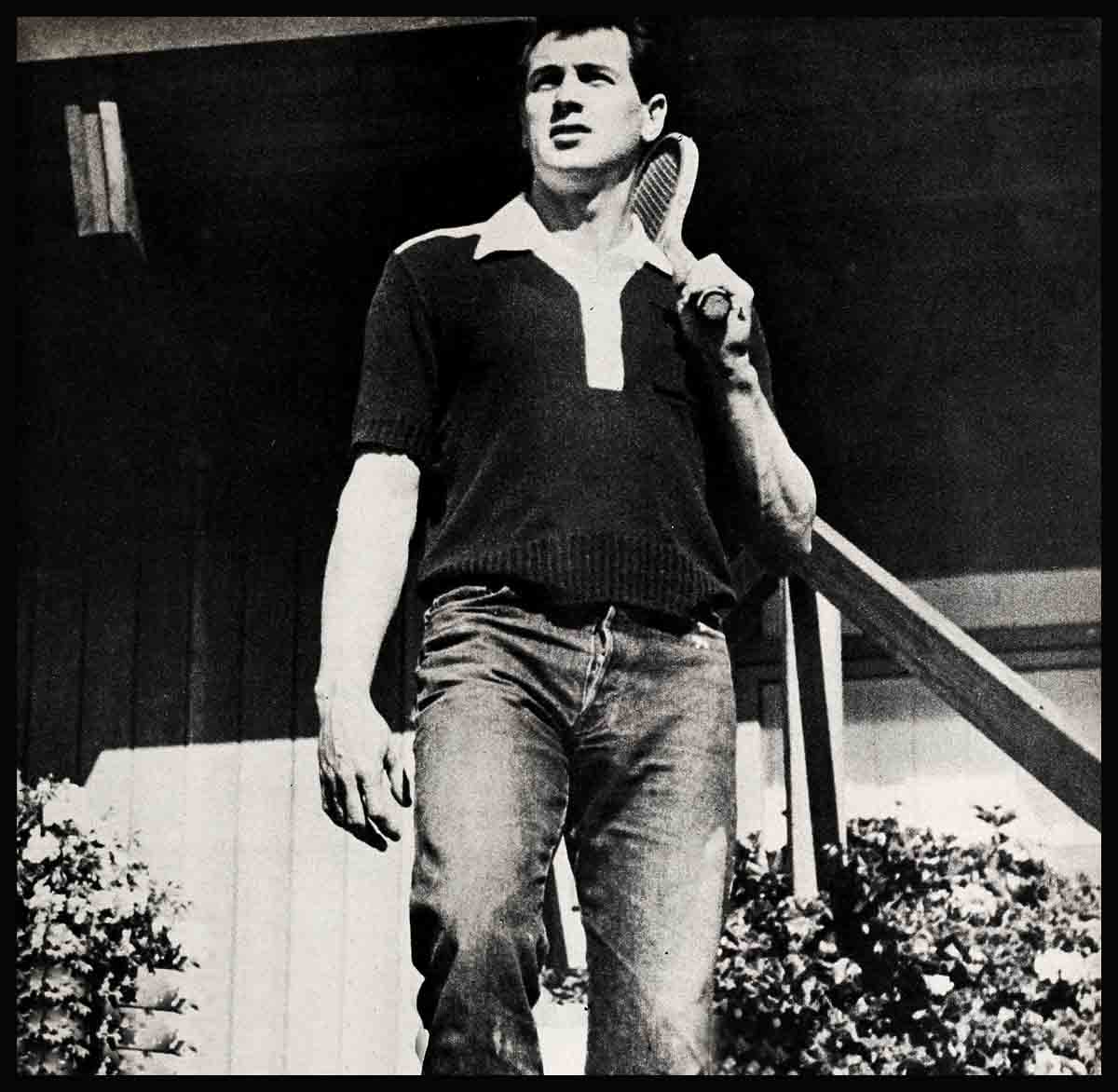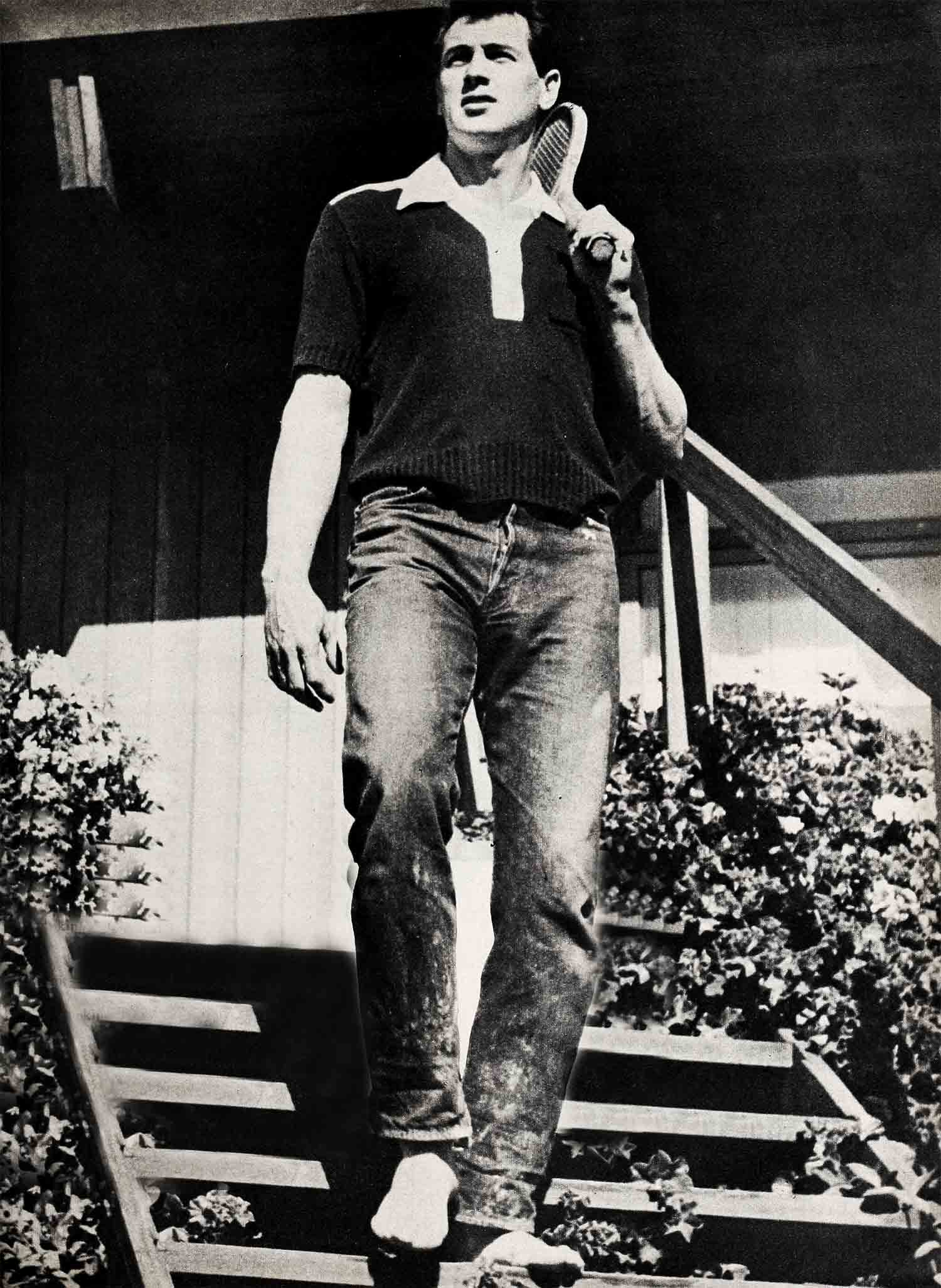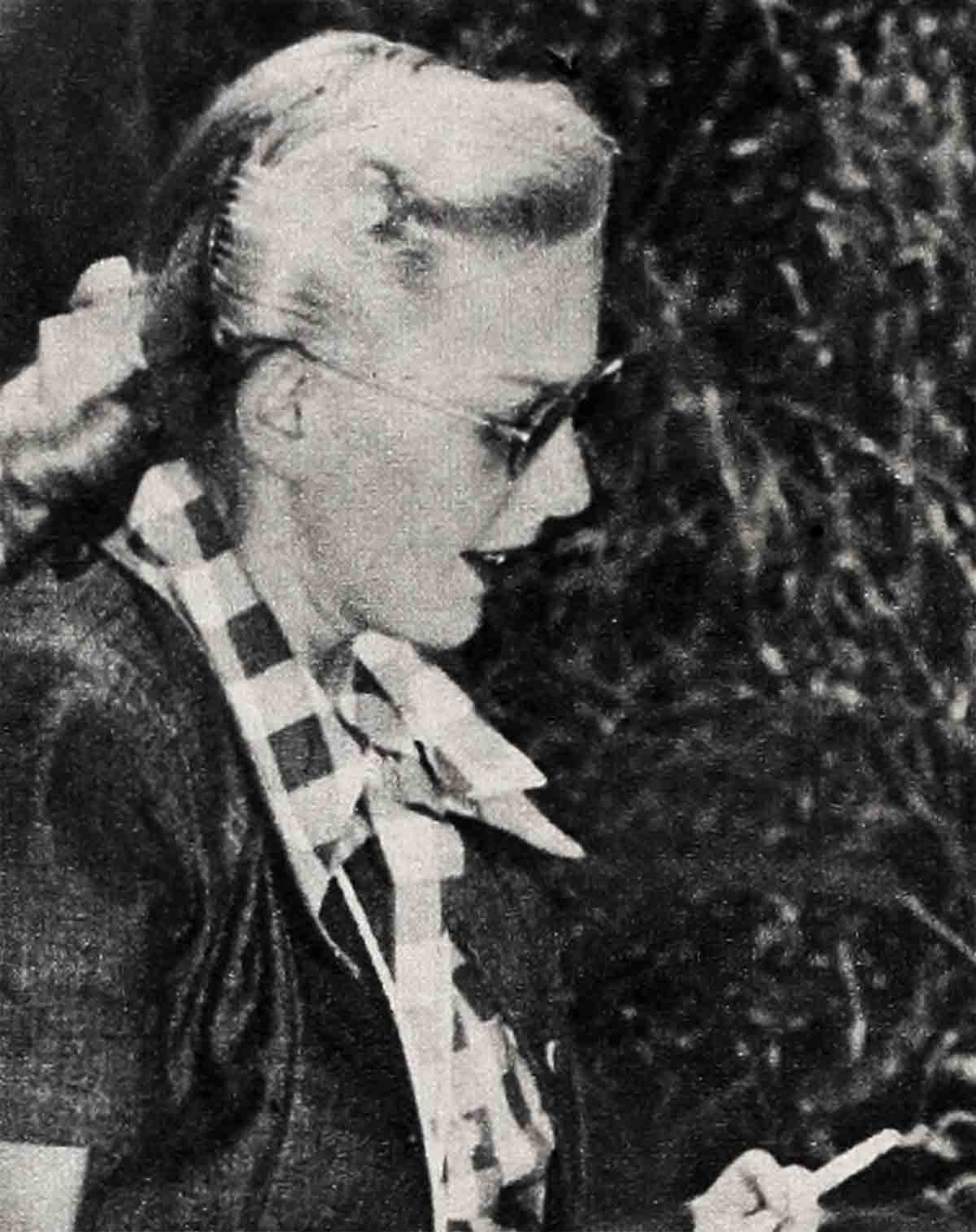
Rock Hudson’s Mystery Girl
At an emergency hospital in Laguna awaiting the ambulance which would rush him to Hollywood, Rock Hudson—through the haze of pain and shock and anger at getting himself smashed up in such an accident—asked that two messages be sent.
One was to the producer of ‘“Magnificent Obsession,” slated soon to roll, perhaps too soon, Rock worried with a sinking heart. The other was a cable to the Savoy Hotel in London, to a lovely, vivid blonde whose importance in Rock’s life had never been more significantly revealed than.in his thinking of her now.
“Sorry can’t drive you home. Just broke my shoulder,” the message read. And it was addressed to “Fortuna Divine,” a gag name Rock often uses for his mystery girl. But to be completely sure that it wouldn’t go astray, a second name, her real one—Betty Abbott—went on the cable too.
Betty, a niece of Bud Abbott and a script girl at Universal-International, is, to use Rock’s word, “radiant.” She’s a striking-looking girl with warmth and understanding and a rare gift for gayety. Born to showbusiness, she’s un-impressed by glamourville, and unless they merit it, by any of those who glitter there. Her sincere frankness, her keen intelligent eye, her sympathetic ear and her love for laughter—all these make hers a welcome companionship. And what with working on the same studio lot with Rock, and often on the same picture, theirs is a camaraderie seldom seen in Hollywood.
Her importance in Rock’s life today is emphasized rather than minimized by the lack of publicity given her. Betty Abbott avoids the spotlight whenever possible, and Rock watches with an old-fashioned and highly approving brown eye. When she’s with him and photographers or columnists close in, Betty adroitly and quietly moves out of the picture.
Betty Abbott—whatever the crisis—has always been nearby. Until this accident, when Rock was surf-riding in Laguna and an angry breaker caught him up to bang him on the beach with such fury that it broke his clavicle in three places.
This time, however, Betty was in England. It was her first trip abroad, and Rock had helped her plan it enthusiastically. When she left, he was in the hospital too—that time recuperating from an emergency appendectomy—and she’d stopped by en route to the plane to say goodbye. Aboard the liner in mid-Atlantic she got a call from him. And remembering his own sense of strangeness at first when he’d arrived in England last year to make a picture, Rock made sure Betty would find a welcome from home. Her hotel room was filled with red roses and a card saying simply, “Have fun, Fortuna.” She was so touched by his thoughtfulness, she’d called him transatlantic just to say thanks.
Among all those closest to him, she knew how much “Magnificent Obsession” meant to Rock. She would know too how much any possibility of losing it through this accident would mean.
Riding back to Hollywood in the ambulance, even with a police escort trying to steer them through traffic, it was rough going. Along with the pain, Rock’s tortured thoughts were of this role, the most important of his career. Every male star in Hollywood had sought to play the challenging characterization in Lloyd Douglas’s moving story.
At St. Joseph’s Hospital, as the bone specialist examined him, Rock had one hope and one small prayer. Namely that if a guy named Roy Fitzgerald from Winnetka, Illinois, had ever done anything whatsoever to merit it, Fate could be generous now.

“How long, Doc?” he asked.
“Hard to say, Rock. We can’t tell until we see the X-rays. Maybe eight weeks,” his doctor said reluctantly.
“Eight weeks! It can’t take eight weeks,” Rock groaned. “The picture’s ready to roll.”
Just then a cable was handed him. “Zounds, Igor! Nurse Nancy Arrives Thursday,” it read.
Rock laughed. And kept laughing. “She always calls me ‘Igor’—or worse,” he explained. X-rays or no X-rays, he felt immediately cheered. It wouldn’t take him eight weeks to knit back. Even Fate was no match for Fortuna—and she was coming home.
As though bringing that happy day even nearer, the phone beside Rock’s bed rang, and the breezy voice of her sister-in-law said, “This is a heck of a way to get out of painting Betty’s room.” Betty would have a few thousand words to say, ribbing him on the same subject, Rock knew.
Propped up in his bed in St. Joseph’s Hospital, with pillows mounded behind his crushed shoulder, Rock had spent a miserable night without sleep. His shoulder was steeled in a plaster cast he described as fashioned “in the form of a figure eight turned on its side—two fours the real hard way.” He agreed this would be a heck of a way to get out of any chore. “As a matter of fact, I like to paint—and I wish I had!”

They’re neighbors, Betty and Rock, only about a yodel and one hilltop removed. He drives her to work every morning; they breakfast together at the studio. In the evening he drops her off at her place on Coldwater Canyon, then swings on up the hill to his redwood-and-glass abode. When they aren’t going out, he stops by frequently, finding it a welcome relief from the day’s tension to wield a paint brush or help with some homey chores or relax over a simple home-cooked meal.
“Little things make me mad,” he said. “I bottle them up inside me until finally when I’m about to explode I wash down Betty’s kitchen walls.”
Once, in a restless mood, Rock began to wash down those kitchen walls. By midnight he’d just gotten to the ceiling, and he’d worked off all his steam. He decided to call in a studio friend, Roger Jones, to help. “Come over here quick!” he said tensely over the phone, explaining nothing. Roger rushed over and was really alarmed to find Betty’s house pitch dark with no sign of life anywhere. He rang the bell. When the door opened, there stood Rock, a white sheet draped around him, a candle in one hand, a lily in the other; in his mouth was a printed sign saying, “Please help me.” Resignedly, Roger rolled up his sleeves and went to work sleepily washing the ceiling. And what was Betty doing? “Getting food out of the icebox, keeping us happy with our work,” Rock grins.
Nobody would understand better than Betty Abbott, with her knowledge of the motion-picture business, her sensitive perception and her intuitive eye, just how great the growing demands of Rock’s career can be and how great is the strain on an amiable guy who can’t say no.
From the moment Rock began hitting the big time, well-meaning individuals have deluged him with advice, some of it so controversial Rock finally exploded, “How can you know what to do?” A pal told him, “You have to learn to pick your people.” One Rock picked was the pretty blonde script girl who watches helpfully as Rock’s star rises. Who understands his moods, his self-doubt, his impatience with himself, and who laughs with him when they run out of kitchen walls.
It was inevitable for two with such kindred tastes and shared laughter, who’ve worked on some eight pictures together, to become close companions. Inevitable that an often avowed “old-fashioned guy” as Rock describes himself would be attracted to the lovely blonde with the merry blue-gray eyes. The girl he refers to as Magda Upswitch, Hezekiah Ormiston, or Fortuna Divine, or any combination of same. Although in Hollywood romantic sweepstakes the pair is given no serious significance, Rock’s closer to Betty than to any of the other girls whose names are variously itemed with his.
“Betty has such a wonderful sense of humor,” he says. “And so much energy it’s all I can do to keep up with her! She’s very intelligent, at home with any group in any discussion, And so understanding too. There are girls, you know, who wouldn’t understand being asked to help wash a car at 1:00 a.m.,” he grins.
When Rock drove his new yellow Lincoln convertible from Detroit, he called from New Mexico, to make sure Betty and a few friends would be waiting up so he could show it to them. It was 1:00 a.m., when he got home. “You can’t ride in it if you don’t help me wash it,” he told Betty. And in blue jeans, laughing like crazy, they washed his new car.
Rock’s always taken a dim view of the ‘fragile little flower” type of girl anyway. “I don’t like helpless women,” he says. “I like one with a mind of her own, who does things for herself. And maybe a few for me,” he adds, with a reflective twinkle.
Their affection has grown with association, since their first meeting, when Rock was playing a bit part in “Bright Victory.” As Rock recalls, “I was only in the first nine pages of the script.” But one day when they were shooting outdoor scenes they had to wait for the sun, and Rock and Betty got into a serious discussion on acting. She was, he noted, very easy to talk to. Also, she had something intelligent to say. They didn’t, however, really become acquainted until they went to Oregon on location for “Bend of the River.” The company was quartered at the Timberline Lodge and Rock and Betty were often invited to shindigs arranged by the college kids who were working at the Lodge during the summer months. Betty suspects their friendship may have mellowed around an open campfire at a steak fry. “Father (as she sometimes calls Rock) ate three steaks on his own—and then I gave him mine,” she recalls.

But their affinity for laughter really attracted them. As Rock observes, “She’s so unaffected. She has no conceit, no ego. She cares nothing for publicity or any of the celebrity routine. So much fun, always herself, never showing off.”
Betty’s laughter has been a boon for him on far more serious occasions too, when she’s notably always standing by. When Rock was thrown from a horse in a frightening accident, and confined to bed until they could determine if there were any internal injuries, Betty and their close friends put on a “wake” for him, gathering at his place. When Rock had his emergency appendectomy recently, out of the haze of ether her pretty, merry face was the first Rock saw. Although pals insist it was the aroma of the platter of golden fried chicken she’d brought him that helped bring him back to the outside world again.
Theirs is an association stimulated by differences of opinion too. One evening after the appendectomy when Betty dropped by the hospital, her quick observant eye noted immediately that Rock’s radio was gone. Realizing how Rock needed it with his habit of keeping music going every waking moment of the day, and knowing his penchant for giving things away, she was concerned. ‘“Where’s your radio?” she asked. “I let a fellow have it,” he said. “What fellow?” she went on, her blue-gray eyes darkening the way they do when her Irish shows. A fellow here in the hospital, old friend of mine,” he said.
“She was so mad,” he laughs, recalling. “But just because she knew how much music means to me. Betty gets mad because she thinks I’m too soft, and I get mad because I don’t think she’s softhearted enough. Although I must say, she’s far more intuitive about people than I am. Just recently, a fellow we both know really turned out to be a big disappointment to me. I thought he was a great guy. Betty had him pegged right all the time.”
Sparks are apt to fly a little too—when Rock plans some exciting adventure for them, some unusual place they’re going to go, something they must do. “Fine—when?” she asks. “Oh—soon,” he answers and comfortably pedals another chorus on the player piano Betty and their other close friends chipped in and bought him for his birthday. When “Bend of the River” was first released about two years ago, Rock insisted they must catch it. “I know it’s something you’ll really enjoy seeing, and I want to take you,” he said. “When?” she inquired. “Oh—soon,” he said. The other day he called saying, “Get dressed right away. There’s some place we must go.” When Betty asked, “Where?” he wouldn’t tell her. “It’s a surprise,” he said. They drove for miles and miles to a small neighborhood theatre away out on the edge of nowhere. “Oh, no!” she said. “Bend of the River” was playing there.
As Betty has said, “I have a temper—but you just can’t stay mad at Rock. When I’m angry I usually get very quiet, but you just don’t do this with dear old Dad. I go off in a corner and start working at my typewriter, and he comes over and starts clowning, and eventually—I laugh.”
Rock brought her an exquisite mantilla with hand-made lace from Belgium last year. Betty bought a black cocktail dress to go with it, and they went to see “Top Banana.” They were sitting third row center and they laughed so hard and loud they stopped the show. Phil Silvers just stood there saying, “We’ll wait . . .” As Rock says, “I felt about three inches high.”
He had no idea what Betty would bring him back from England. But to bring her own merry self back—and pronto—would be present enough.
Betty brought him back the merriest colored argyles she could find, and a whole colony of leprechauns, and the admonition never to trip over an ocean breaker again when she’s away. Soon after receiving Rock’s cable, the studio had called urging, “Can you possibly be back by the seventeenth?” Then the connection failed and for thirty minutes Betty was wondering, “What’s happened to him now?”
She got home to find dozens of red roses in front of her door with a card saying, “Igor Follows.” And broken shoulder or no, within a matter of minutes Igor did. He came in slowly, walking like he was “165 years old,” wearing blue jeans, moccasins, and a shoulder-hunchback. “My gosh, Father, what’s happened to you?” she. asked. “If this isn’t typical of The Hudson? Who else but Monster would let a freak thing like this happen?”
When Betty said she must go to the studio the next day, Rock said, “If you’ll drive, I’ll go with you.” The word went all over the lot, and in the studio commissary they were ganged. “Betty’s back—Rock’s up,” the happy word spread.
“Magnificent Obsession” would roll, with only a week’s delay. And if you ask Betty Abbott, it couldn’t happen to a more deserving character. Rock, however, isn’t so sure. “This is the toughest, most complex characterization I’ve ever attempted. When you think about Jane Wyman, Agnes, Moorehead, Charles Bickford—what can I possibly contribute to a cast like that?”
Of course, Betty Abbott is the girl who could set “dear old Dad” straight in this respect too. “She’s my best booster,” he says. “Whenever I get discouraged or think I’m terrible, Betty says, ‘Well, Father, I don’t think so . . .’ And she’s right about so many things I’d like to think she might be right about this too.”
For many reasons, the Lloyd Douglas story is one close to Rock Hudson’s heart. “I believe in Magnificent Obsessions. I don’t make it my life-long occupation. But I like giving ‘presents.’ ” he says. Much in the’ tone of one who believes that with today’s luck he’s going to have to give a lot more to balance the score.
Take, for instance, the laughter and friendship and faith of a girl called—by Rock—Fortuna Divine.
THE END
It is a quote. PHOTOPLAY MAGAZINE NOVEMBER 1953




